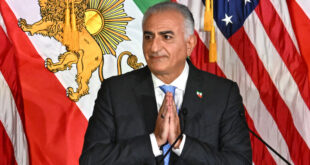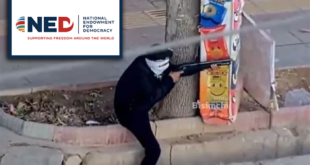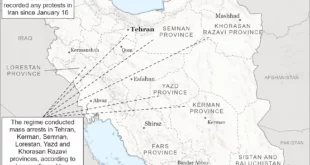DUBAI (AFP) — Britain’s Tony Blair on Wednesday accused Iran of being an obstacle to peace in the Middle East and urged moderate countries in the region to form an alliance to oppose its support for extremism.
Speaking to local and British business leaders in Dubai, the prime minister made his strongest criticism yet of Tehran, which the West fears wants to build nuclear weapons and suspects support groups like Hizbollah and Hamas.
“We must recognise the strategic challenge the government of Iran poses, not its people, not possibly all of its ruling elements but those presently in charge of its policy,” he said.
“They seek to pin us back in Lebanon, in Iraq, in Palestine. Our response should be to expose what they are doing, build up alliances to prevent it and pin them back across the whole of the region.” Blair’s comments came as he wound up a region-wide tour that has taken him to Turkey, Egypt, Iraq, Israel and the Palestinian territories in the past five days to seek assessments on the current state of the Middle East peace process. At each turn, he has stressed the need for those who believe in democracy and modernisation to come together against those who foment reaction and extremism. Part of that involves supporting moderate Muslim opinion to help curb violence and extremism in areas like the Palestinian territories and Iraq.
The oil-rich United Arab Emirates — which Blair has said is making tentative steps towards political reform at its first national polls — was an example to nearby countries on what can be achieved in the right conditions.
“Out of this region, with its complex, fascinating history, has come this challenge. Within this region will come the solution, but everywhere the impact of its future, for good or ill, will be felt,” he said.
“It’s not too late, but in my view it’s urgent.” Blair, who pledged a renewed round of intensive diplomacy on the Middle East in the new year, said the clash between the two ideologies stretched to places like Afghanistan, Pakistan, Sudan and Somalia.
“The lesson of all this I see as startlingly real, clear and menacing. There is a monumental struggle going on worldwide between those who believe in democracy and modernisation and the forces of reaction and extremism.
“It is the challenge of the early 21st century,” he said.
In extracts released to reporters in advance Tuesday night, Blair’s office said the prime minister would describe Iran as a “strategic threat”, but even the toned down “strategic challenge” he spoke of Wednesday was still bullish.
Previously, Blair has trodden a more tempered path, offering Iran and Syria the chance to play a constructive role with the international community — but there was no mention of that Wednesday.
His remarks coincided with a US television report that the Pentagon was planning a major deployment of naval forces to the Gulf in 2007 in response to what Washington considers acts of provocation by Iran.
The Pentagon, however, would not confirm the CBS television report.
Blair’s spokesman countered suggestions that his stance was at odds with the recent US Iraq Study Group, which called for greater engagement with Iran to help end bloody sectarian violence in Iraq.
Neither was he seeking to create a Sunni bloc against predominantly Shiite Iran, putting the two Muslim traditions at loggerheads, he added.
Instead, he said the call for an “alliance of moderation” was due to the clearer recognition of extremism by foreign powers and the need to respond to Iran’s belligerent tone towards Israel, for example.
The spokesman said Blair had been “struck” by the increased willingness on both sides of the Israeli-Palestinian question to engage more to end the stalemate.
To that end, Blair on Wednesday called for a bolstered Palestinian president’s office, an early meeting of leaders on both sides and a relaunch of the political process towards a two-state solution.
All three priorities were “deliverable but have to be delivered”, he said.
As well as Iran’s nuclear programme, Blair is concerned about suspected Iranian backing for Shiite groups fighting British forces in southern Iraq plus its support for the ruling Islamists in the Palestinian territories.
 Eurasia Press & News
Eurasia Press & News



